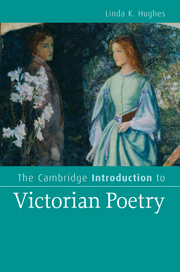Book contents
- Frontmatter
- Contents
- List of figures
- Preface
- Acknowledgments
- Editions cited
- Introducing Victorian poetry
- Part I The forms of Victorian poetry
- Part II The rhetoric of Victorian poetry
- Introduction to Part II
- 4 Poetry, technology, science
- 5 Poetry and religion
- 6 Poetry and the heart's affections
- 7 Poetry and empire
- 8 Poetic liberties
- 9 Resisting rhetoric: art for art's sake
- Part III Coda Close readings
- Glossary
- Notes
- Further reading
- Index
- Cambridge Introductions to Literature
4 - Poetry, technology, science
Published online by Cambridge University Press: 05 June 2012
- Frontmatter
- Contents
- List of figures
- Preface
- Acknowledgments
- Editions cited
- Introducing Victorian poetry
- Part I The forms of Victorian poetry
- Part II The rhetoric of Victorian poetry
- Introduction to Part II
- 4 Poetry, technology, science
- 5 Poetry and religion
- 6 Poetry and the heart's affections
- 7 Poetry and empire
- 8 Poetic liberties
- 9 Resisting rhetoric: art for art's sake
- Part III Coda Close readings
- Glossary
- Notes
- Further reading
- Index
- Cambridge Introductions to Literature
Summary
Those hells upon earth, since the Steam King's birth
Have scatter'd around despair;
For the human mind for heav'n design'd,
With the body, is murdered there.
Edward P. Mead, “The Steam King”A sad astrology, the boundless plan
That makes you tyrants in your iron skies,
Innumerable, pitiless, passionless eyes,
Cold fires, yet with power to burn and brand
His nothingness into man.
Tennyson, Maud (1855), 1.634–8From coupler-flange to spindle-guide I see Thy Hand, O God –
Rudyard Kipling, “McAndrew's Hymn”
(Scribner's Magazine [December, 1894]), 3Marshall Berman's characterization of modernity aptly encapsulates the Victorian experience of confronting rapid technological development and scientific breakthroughs: “To be modern is to find ourselves in an environment that promises us adventure, power, joy, growth, transformation of ourselves and the world – and, at the same time, that threatens to destroy everything we have, everything we know, everything we are.” For engineers, capitalists, and middle-class employees, technology was an engine of profit; new machines also benefited writers and readers, distributing print nationwide in mere hours and lowering printing costs until anyone with a penny could purchase hours of reading. McAndrew, the Scottish engineer and servant of empire in Kipling's “Hymn,” even sees God's providence in his steamship's machinery. But to workers harnessed to and sometimes mauled by machines, whose wages were kept low by the same economic system that spurred development, new technologies were a harrowing source of misery.
- Type
- Chapter
- Information
- The Cambridge Introduction to Victorian Poetry , pp. 118 - 139Publisher: Cambridge University PressPrint publication year: 2010

